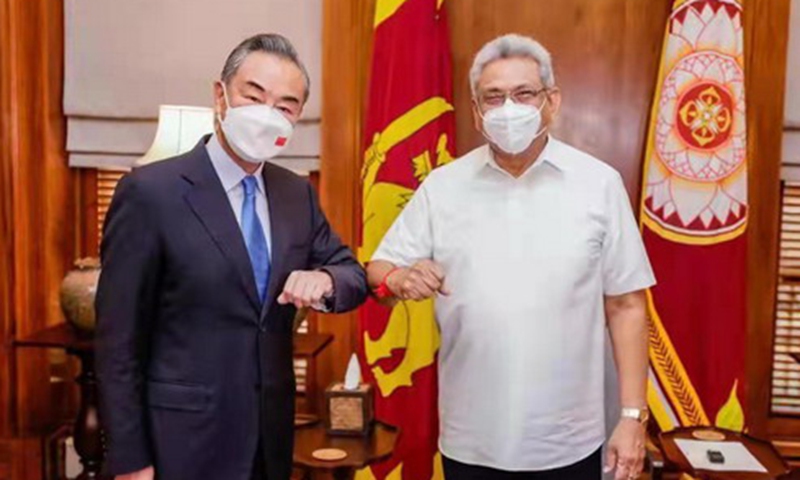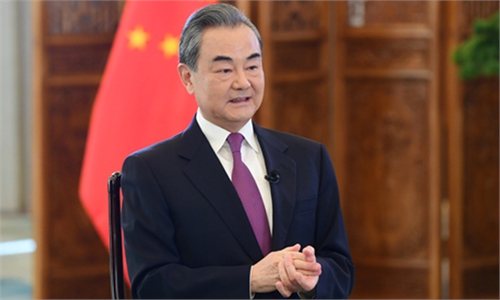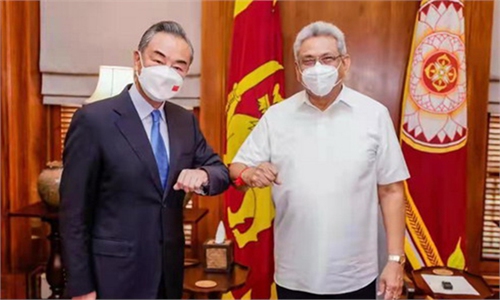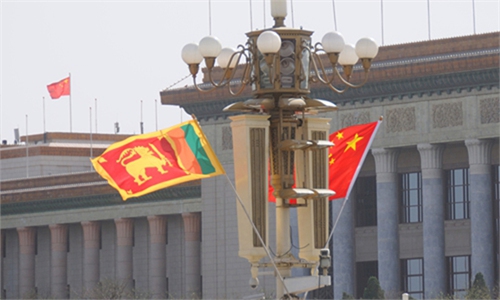Chinese FM wraps up visit in Sri Lanka that boosts trade, while Western media unfairly hypes debt issue

Sri Lankan President Gotabaya Rajapaksa meets with State Councilor and Foreign Minister Wang Yi on January 9, 2022. Photo:fmprc.gov.cn
Chinese State Councilor and Foreign Minister Wang Yi successfully wrapped up his first New Year trip on Sunday in Sri Lanka, the last leg of a multinational trip that also took him to three African countries and the Maldives, with deepened mutually beneficial pragmatic cooperation, which Chinese observers said cannot be shaken by some noise from Western media that labeled such cooperation "debt trap" or "white elephant projects" in order to smear China and sow discord between China and other countries.
During a meeting with Sri Lankan President Gotabaya Rajapaksa in Colombo on Sunday, Wang called on China and Sri Lanka to discuss the restart of talks on free trade agreement by tapping the opportunities of the Regional Comprehensive Economic Partnership (RCEP) agreement and China's vast market. Wang said the Colombo Port City and Hambantota Port projects could be engines for pushing forward bilateral cooperation.
China proposed a forum on the development of Indian Ocean island countries to build consensus and synergy, and promote common development, in which Sri Lanka can play an important role, said Wang.
According to the government of Sri Lanka, Rajapaksa expressed his gratitude to the Chinese government for its continued support in providing Sinopharm vaccines to Sri Lanka for the successful implementation of the COVID-19 vaccination program. He also said it would be "a great relief" to the country if the attention could be paid on restructuring the debt repayments as a solution to the economic crisis that has arisen in the face of the pandemic.
Western media like AFP and Reuters, reporting the president's remarks, slandered cooperation projects between China and Sri Lanka as "white elephant projects" with low returns.
In response, Wang Wenbin, spokesperson of the Chinese Foreign Ministry, said at Monday's media briefing that calling the cooperation projects between China and Sri Lanka "white elephants" is completely untrue, as China has been helping Sri Lanka's development within its capacity and will continue to do so and the bilateral cooperation is welcomed by local people.
Observers believe China would offer a helping hand to Sri Lanka to deal with its financial crisis through friendly negotiations, as China has been easing many developing countries' debt burden and has the highest deferral amount among G20 members. But they stressed that as China only accounts for 10 percent of Sri Lanka's foreign debt, it is imperative for other lenders such as the Asian Development Bank (ADB), Japan and the US to jointly help the island nation tide over difficulties rather than just sit back or even smear China's efforts.
White elephants?
The island nation is gripped by one of the worst economic crises, and several credit rating agencies including Moody's and Fitch downgraded its credit rating from B to C.
Sri Lanka relies heavily on tourism and imports. But in the pandemic, its essential goods including rice, sugar and gas are in short supply, Yang Shiyuan, chief media officer at the Chinese Chamber of Commerce in Sri Lanka, told the Global Times on Monday.
Sri Lanka sought China's help for the restructuring of its loans as the epidemic has intensified the risk of Sri Lanka's debt default, Song Wei, a research fellow at the Chinese Academy of International Trade and Economic Cooperation, told the Global Times on Monday.
China will actively respond to Sri Lanka's request like what China did to African countries, Chinese observers said. After the outbreak of the COVID-19 pandemic, China announced the cancellation of 15 African countries' debt in the form of interest-free government loans that were due to mature by the end of 2020.
It is likely that China may exempt part of the interest-free loans to Sri Lanka. And for preference loans that are not eligible for debt relief, China may work with Sri Lanka through negotiations, equity cooperation and rescheduling, Song said.
There are three capital approaches for China's foreign assistance, of which the interest-free loans offered by the Chinese government are applicable for debt relief while the concessional loans raised through the market cannot be written off, she said.
According to data from Sri Lanka's Department of External Resources, China only accounts for about 10 percent of Sri Lanka's $35 billion foreign debt as of April 2021. Japan also accounted for about 10 percent of Sri Lanka's foreign debt.
Long Xingchun, a senior research fellow at the Academy of Regional and Global Governance of the Beijing Foreign Studies University, told the Global Times on Monday that Sri Lanka's debt to China is only a fraction of its total foreign debt, and Western media hype of China's part was distorting facts and smearing China.
Only restructuring loans with China was not enough to help the island nation tide over its difficulty, which needs a package plan with other involved parties, Long said.
"Sri Lanka's crisis is also a test to countries like Japan, India and the US on how much help they would offer, but what we see now is that they are standing by and even defaming China which is truly helping the country," Long said.
Some foreign media mentioned nothing about other involved parties' responsibility but claimed that Sri Lanka's economic crisis was partly due to "Beijing-financed projects that don't generate revenue."
But to Yang, Chinese investments made great efforts in helping the local economic and social development in recent years, which people in Sri Lanka are very grateful for.
The rich cultural activities organized by Chinese enterprises in Colombo Port City has made Colombo Lotus Tower a new local landmark, and the Hambantota Port project helped drive the local land price, she said, adding that the popularity of Chinese vaccines among local people was one proof of their trust in Chinese products, and many locals she knew would like to study in China.
Many infrastructure projects China and Sri Lanka worked together on, including ports and highways, require large amounts of investments and a long construction period, which shows returns of up to 20 to 30 years, Long said, noting hyping their returns when the projects just started was unprofessional and had ulterior motives.
Wang's Sri Lanka trip also gained wide attention from Indian media, which has been closely following the trip in the context of what it sees as China-India competition in South Asia.
Indian media would jump on any news related to South Asian countries, which India believes are its backyard. It's incapable of helping regional countries with their economies, Hu Zhiyong, a research fellow at the Institute of International Relations of the Shanghai Academy of Social Sciences, told the Global Times, calling India's thinking "gangster logic."





